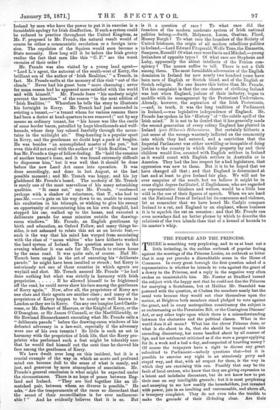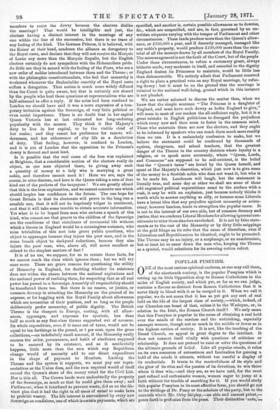THE PEOPLE AND THE PRINCESS.
THERE is something very perplexing, and to us at least not a little irritating, in the sudden outbreak of popular feeling against the marriage of the Princess Louise, an outbreak so bitter that it may yet provoke a discreditable scene in the House of Commons. In every great borough the first question asked of a representative is whether he intends to vote against the grant of a dowry to the Princess, and a reply in the negative very often evokes an unmistakable hiss. Mr. Forster at Bradford turned the subject with the happy mot that he could not fine the Princess for marrying a Scotchman, but at Halifax Mr. Stansfeld was pestered with the question, at Chelsea the members nearly lost the usual vote because they would not clear themselves upon the matter, at Brighton both members stand pledged to vote against the grant, and in every metropolitan constituency the subject is as embarrassing as the Permissive Bill, or the Contagious Diseases' Act, or any other topic upon which there is a misunderstanding between the electorate and the political classes. What in the world does it all mean ? What has the clever Princess done, or what is she about to do, that she should be treated with this exceeding discourtesy, her name bandied about by all manner of lips, and her settlement criticized as if she were a pauper applying for 2s. a week and a loaf a day, and suspected of hoarding money ? Of course the taxpayers have a right to discuss any grant submitted to Parliament—nobody questions that—but it is possible to exercise any right in an atrociously petty and stupid way, and that, with all respect for them, is the way in which they are exercising this one. Possibly that may be the fault of local orators, who know that they are giving expression to a latent and indefinite discontent, but do not know how to put their case on any intelligible grounds ; but it is most perplexing and annoying to see how readily the householders, just invested with power, join in an insulting and unreasonable, and above all, a trumpery complaint. They do not even take the trouble to make the grounds of their ill-feeling clear. Are their
members to resist the dowry because the electors dislike the marriage? That would be intelligible and just, the electors having a distinct interest in the marriage of any one within the line of the succession, but there is no trace of any feeling of the kind. The German Princes, it is believed, with the Kaiser at their head, condemn the alliance as derogatory to the Royal caste, and declare that they will not receive the Marquis of Lome any more than the Marquis Rapallo, but the English electors certainly do not sympathize with the Hohenzollern pride. As little are they in accord with the feeling of the Peers, who see a new order of nobles introduced between them and the Throne ; or with the philosophic constitutionalists, who feel that monarchy is weakened whenever the Brahminlike sanctity of the Royal caste suffers a derogation. That notion is much more widely diffused than the Court is quite aware, but that is certainly not shared by the people who hurl these questions at representatives who are half-ashamed to offer a reply. If the noise had been confined to London we should have said it was a mere expression of a tem- porary irritation against the Sovereign, of very little political or even social importance. There is no doubt that in her capital Queen Victoria has at last exhausted her long-enduring popularity with the masses. They think it Her Majesty's duty to live in her capital, to be the . visible chief of her realm ; and they resent her preference for remote wil- dernesses, and her abhorrence of city life as a dereliction of duty. That feeling, however, is confined to London, and it is out of London that the opposition to the Princess's dowry is fiercest and most loud.
Is it possible that the real cause of the fuss was explained at Brighton, that a considerable section of the electors really do object, as one man objected there, to giving away such a quantity of money to a lady who is marrying a great noble, and therefore cannot need it ? Here we are, says the orator, in utter distress, and here is the Queen taking a sum of that kind out of the pockets of the taxpayers ! We are greatly afraid that this is the true explanation, and we cannot conceive one which should inspire lees confidence in the future. The one hope for Great Britain is that its electorate will prove in the long run a sensible one, that it will not be hopelessly vulgar in sentiment, and that it will take some trouble to obtain accurate information. Yet what is to be hoped from men who endorse a speech of this kind, who cannot see that grants to the children of the Sovereign are the conditions of that stateliness of ceremonial life without which a throne in England would be a meaningless nuisance, who raise trivialities of this sort into grave public questions, who object to appanages because they injure the poor man, and in the same breath object to dockyard reductions, because they also injure the poor man, who, above all, will never recollect or -attend to the simplest matters of fact ?
It is of no use, we suppose, for us to restate those facts, for we cannot reach the class which ignores them ; but we will try once more. There are grave reasons for questioning the utility of Monarchy in England, for doubting whether its existence does not widen the chasm between the national aspirations and the national power of realizing them, for suspecting that as all real power has passed to a Sovereign Assembly all responsibility should be transferred there too. But there is no reason, or justice, or common decency. in attacking the Monarchy on the ground of its expense, or for haggling with the Royal Family about allowances which are necessities of their position, and so long as the people deliberately prefer monarchy, of public dignity. The British Throne is the cheapest in Europe, costing, with all allow- ances, appanages, and expenses for symbols, less than half as much as any first-class throne supported out of revenue. Its whole expenditure, even if it came out of taxes, would not be equal to ten farthings in the pound, or 1 per cent. upon the gross collections,—an indefinitely small amount, if the Monarchy really secures the order, permanence, and habit of obedience supposed to be ensured by its existence, and as it accidentally happens,. little more than the sum which any Republican change would of necessity add to our direct expenditure in the shape of payment to Members. Lacking the Throne and the system it supports, we must pay our repre- sentatives as the Union does, and the sum required would of itself exceed the Queen's share of the money voted for the Civil List. Nor is this all. The Crown lands were undoubtedly the property of the Sovereign, so much so that he could give them away ; and Parliament, when it interfered to prevent waste, did so on the dis- tinct plea that it had the right in all cases of entail to make laws to prohibit wastry. The life interest is surrendered by every new Sovereign on conditions, one of which is certain payments, which are specified, and another is, certain possible allowances as to dowries, &c., which are unspecified, and are, in fact, governed by an un- written etiquette varying with the temper of Parliament and other circumstances. These lands produce more than the Queen's allow- ance, or 1350,000 a year, and if decently managed, managed like any noble's property, would produce /100,000 more than the sum- total of all the moneys drawn by all members of the Royal Family. The mismanagement is not the fault of the Court, but of the people Under those circumstances, to refuse a customary grant, always hitherto made, very moderate in itself, and essential to the dignity England desires its Princesses to maintain, would be little less than dishonourable. We entirely admit that Parliament reserved a right to place a practical veto on any Royal marriage, by refus- ing dowry ; but it must be on the ground that the marriage is inimical to the national well-being, ground which in this instance is not pleaded.
We are rather ashamed to discuss the matter thus, when we know that the simple sentence "The Princess is a daughter of England, and must have such dowry as befits England to give," will seem to most of our readers the all-sufficient reply, but it is a great mistake in English politicians to disregard the prejudices which every now and then seem to fester in the common mind. Those who entertain them are now the electors, and they ought to be informed by speakers who can reach them much more readily than we can. It is a melancholy confession to make, but we believe the statement could be confirmed by thousands of squires, clergymen, and school teachers, that the greatest danger of the Throne in the country districts where loyalty is a religion, or to speak more accurately, where "Queen, Lords, and Commons" are supposed to be self-existent, is the belief that the "Queen's taxes" are levied by the Queen herself, and spent at Her Majesty's discretion, which just now is to give some of the money to a Scottish noble who does not want it, but who is to be made fat. Londoners will laugh, but the statement is literally true, and some day or other we shall see some of these odd engrained political superstitions come to the surface with a rush, it may be with an explosion, just because nobody thinks it worth while to answer anything so silly, or because some Liberals have a latent idea that any prejudice against monarchy or aristo- cracy, however baseless, tends to strengthen the popular cause. It is not in the interest of our own side, but of common decency and justice, that we condemn Liberal Members for allowing ignorant con- stituents to utter these slanders unrebuked. It is not by false state- ments as to the cost of the Monarchy or by dirty little snippings at the gold fringe on its robe that the cause of liberalism, even if Liberalism and Republicanism be identical, ought to be promoted. The Throne may be an injury, or a surplusage, or an anachronism, but at least let us sneer down the men who, keeping the Throne as a symbol, would substitute for its covering cotton velvet.



































 Previous page
Previous page